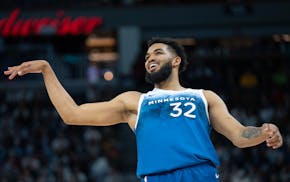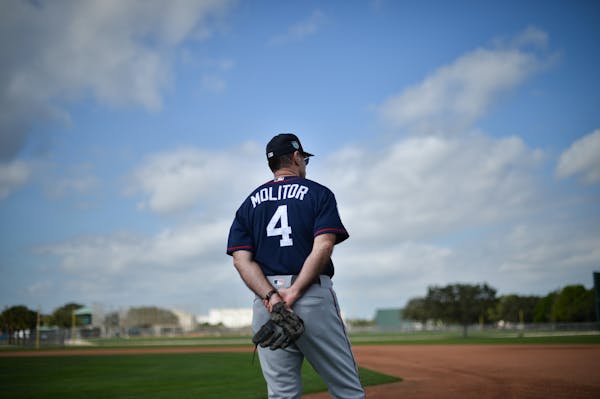Seventy-eight wins and 84 losses. Those are the raw numbers in the American League standings that provide the bookends for Paul Molitor's time as a prominent member of the Twins' organization.
Those numbers do not come close to telling the tale of this baseball man from the playgrounds of St. Paul.
Molitor came back home to play for the Twins in 1996, a season in which he turned 40 in August. He had become an all-time Brewers favorite in Milwaukee, and a World Series MVP in Toronto, and now he was back in Minnesota, with a two-year contract and needing 211 hits to reach the 3,000 needed to open wide the front door to Cooperstown.
Who could have imagined that Molitor would get to 3,000 that season, with a triple in Kansas City on Sept. 16, 1996, and a dozen games left on the schedule? Who could have imagined a 40-year-old with 225 hits, both a career-high and the most in the American League?
The Twins had finished 32 games under .500 in a 144-game season in 1995, and it was the brilliance at the top of the order from Molitor and Chuck Knoblauch that kept them relevant into the late summer of 1996, before falling off to 78-84.
It is perhaps the greatest what-if in Twins history when you consider that Kirby Puckett would have been batting third behind Molitor and Knoblauch, if Puck had not awoken with that dot in front of his right eye near the end of spring training.
"Knoblauch and Molitor had those big seasons at the top of the order,'' manager Tom Kelly said. "We felt we might be able to give the Twins something special, with Paul and Puck hitting back-to-back. I've always felt the baseball fans were cheated here when that didn't happen.''
That was a glimmer of promise in what would become an eight-year stretch of losing seasons (1993-2000). It took until the past eight years for that futility to be rivaled. There were four seasons of more than 90 losses, and that landed Molitor in the manager's office in 2015 as a replacement for Ron Gardenhire.
Somehow, there were 83 wins that first season, and then a Minnesota record 103 losses in 2016, and then a wild-card appearance with an 85-77 record that made Molitor the AL's Manager of the Year in 2017.
The failures of many led to 78-84 this season, and the baseball wizards at Target Field couldn't wait to fire Molitor on Tuesday. Admittedly, his work to coax the Twins to 78-84 in 2018 was not as impressive as forcing them to 78-84 in 1996, but player or manager, Paul Molitor was an asset for this franchise in hard times.
The snapshots to remember are not a guy reaching his 60s looking at his notes in the dugout, of course; those come from the Metrodome, County Stadium, the Skydome, and Busch Stadium, and a spring training ballpark in Sun City, Ariz.
That's the first time I saw Molitor in a big-league uniform: The Twins stopped in Arizona before opening the 1978 season in Seattle, and played a couple of games against the Brewers.
Molitor was less than 10 months from leading the Gophers to what stands as their last College World Series. He had played 64 games in the Midwest League and batted .345. Robin Yount was injured and Molitor opened the season as the Brewers' shortstop.
"He'll go back when Robin gets healthy,'' was the word from the Brewers during the Twins' visit.
Yount got healthy and Molitor stayed. And I swear, 40 years later, I can still see this:
Molitor leads off the bottom of the first. A Twins pitcher (Paul Thormodsgard?) throws a first-pitch fastball and Molitor jumps it and hits a screamer into left-center.
They learned it at Dunning Field in St. Paul, and at Siebert Field in Minneapolis, and now the Twins had learned it in Sun City: Don't throw a first-pitch fastball to Paul Molitor.
I had the privilege of being there when Molitor had a record five hits in the first game of the 1982 World Series in St. Louis. I was there when he was the MVP of the 1993 World Series for Toronto, and how great do you have to be to take the MVP away from a teammate who hits a lives-in-infamy, game-winning home run, as did Joe Carter?
Molitor was 12-for-24 great in that series. And 225-hit great for the 1996 Twins. And, yeah, 39-game-hitting-streak great that made him a feature on the national nightly news in the summer of 1987.
None of these Molitor feats ever surprised me, not after seeing the blur of his bat flatten that first-pitch fastball in Sun City. It pretty much took until Tuesday to be surprised by anything with Paul Molitor, but when you are geniuses reinventing a game that's already been reinvented, you don't have a choice:
You have to do what those big brains tell you to do.

Reusse: Success on court helped Timberwolves do strong business

Reusse: Taylor's story. 'I just bought the Minnesota Timberwolves.'

Reusse: Back from injury, Towns doesn't have to carry load


